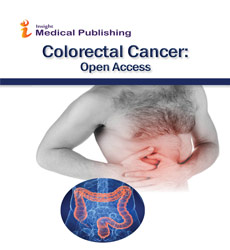Abstract
Screening for Colorectal Malignancy
Colorectal cancer is the third most common cancer and the third leading cause of cancer death in men and women in the United States. Despite being so common, colorectal malignancies pose a significant early diagnostic problems due to wide variety of reasons which include lack of awareness of risk factors, avoidance of doctor check-ups, fear of getting tested, perception as “man’s disease”, no symptoms/no problem and lack of proper set-up/colonoscopy especially in remote areas. Numerous international CRC screening programs have been initiated as evidence grows for an impact of CRC screening on mortality. Death from colorectal cancer is preventable. Effective, safe, and relatively inexpensive methods for screening for the disease have been available. The time taken by a sessile polyp to get converted into pedunculated and frank adenocarcinoma is considered as golden period of time for early detection of colorectal malignancies. Even after development of malignancy in the initial stages when the disease is localized the chances of five year survival go as high as 80% and when it has distant metastasis it goes below 10%.
Nearly 90% of colon cancer patients are over the age of 50. Other risk factors include: family or personal history of colon cancer or polyps, chronic inflammatory bowel disease, hereditary colorectal syndromes, use of cigarettes and other tobacco products, high-fat/low fiber diet and physical inactivity.
Screening for colorectal cancer clearly reduces colorectal cancer mortality, yet many eligible adults remain unscreened. Various screening techniques used for detection of colorectal malignancies Fecal occult blood testing (FOBT), Barium enema, Flexible sigmoidoscopy, Colonoscopy, Virtual Colonoscopy, Carcinoembryonic antigen and other tumour markers, Fecal DNA and Genetic testing. The recommendation that all men and women aged 50 years or older undergo screening for colorectal cancer is supported by a large body of direct and indirect evidence.
Colorectal cancer screening has been recommended by the U.S. Preventive Services Task Force (USPSTF) and many other organizations for more than 10 years. On the basis of evidence from multiple randomized, controlled trials (RCTs), a screening program with repeated annual or biennial guaiac fecal occult blood tests (FOBTs) and endoscopic follow-up of positive test results reduces colorectal cancer mortality; according to a recent update, colorectal cancer mortality was reduced 16% (CI, 10% to 22%) after 12 to 18 years. Extrapolating from trial evidence, clinical studies of test accuracy, and other supporting evidence, the USPSTF recognized flexible sigmoidoscopy (with or without FOBTs), colonoscopy, and double-contrast barium enema as other colorectal cancer screening options in 2002. However, because colorectal cancer screening tests have potential harms, limited accessibility, or imperfect acceptability to patients, and no tests could be identified as superior in cost-effectiveness analysis, the USPSTF also recommended that choice among recommended methods for colorectal cancer screening to be individualized to patients or practice settings.
Author(s):
Tajamul Hassan, Fazl Qadir Parray, Nisar Ahmad Chowdri and Khursheed Alam Wani
Abstract | Full-Text | PDF
Share this

Google scholar citation report
Citations : 92
Colorectal Cancer: Open Access received 92 citations as per google scholar report
Abstracted/Indexed in
- Google Scholar
- JournalTOCs
- China National Knowledge Infrastructure (CNKI)
- Directory of Research Journal Indexing (DRJI)
- WorldCat
- Publons
- International Committee of Medical Journal Editors (ICMJE)
- Secret Search Engine Labs
Open Access Journals
- Aquaculture & Veterinary Science
- Chemistry & Chemical Sciences
- Clinical Sciences
- Engineering
- General Science
- Genetics & Molecular Biology
- Health Care & Nursing
- Immunology & Microbiology
- Materials Science
- Mathematics & Physics
- Medical Sciences
- Neurology & Psychiatry
- Oncology & Cancer Science
- Pharmaceutical Sciences

